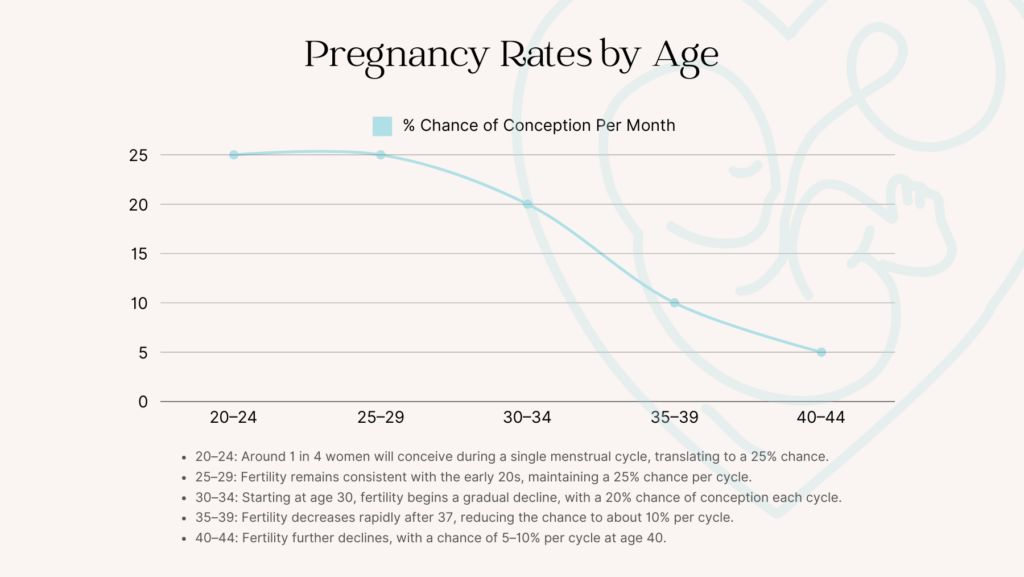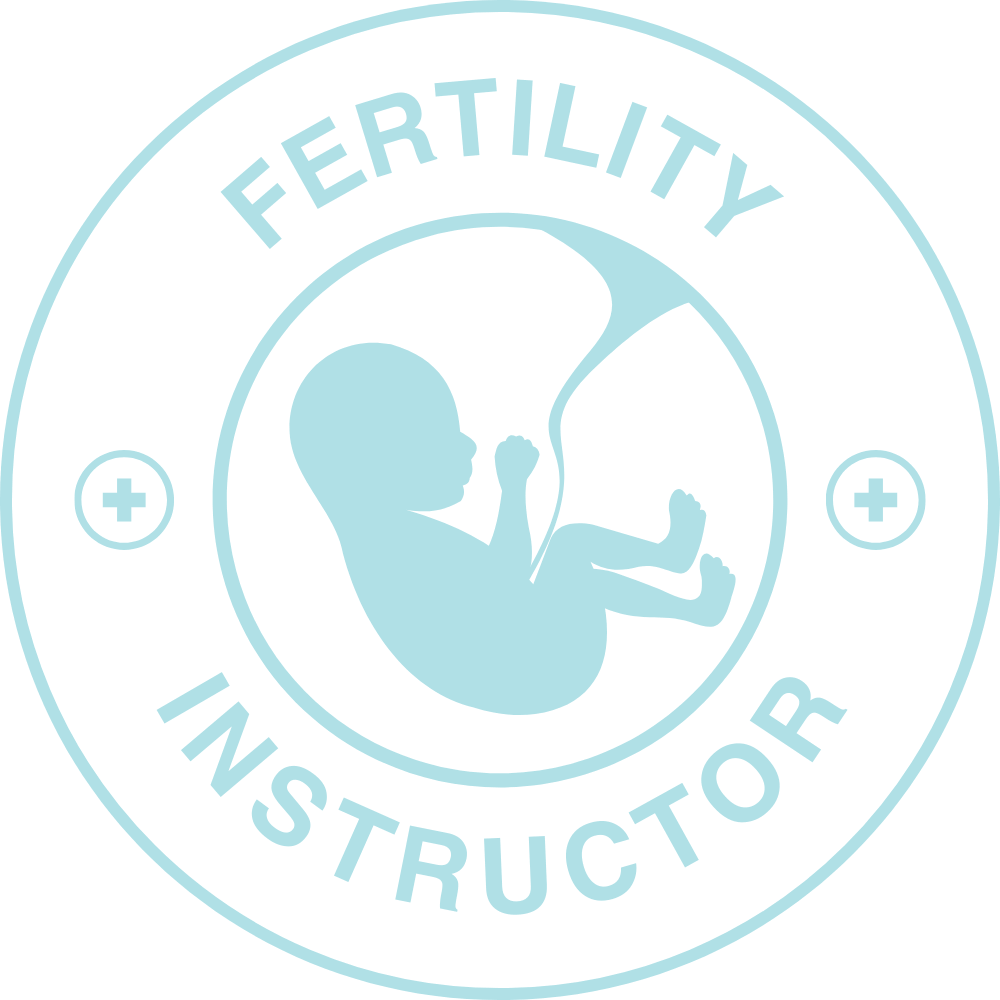
For anyone who’s considering starting a family, it’s important to learn about the connection between age and fertility. Understanding how fertility changes over time can help set realistic expectations and guide important decisions.
While it’s true that age affects both women and men, the impact is more pronounced for women due to the natural decline in egg quality and quantity.
In this post, we’ll explore how fertility changes with age, what the numbers really mean, and what options are available for those who might need a little extra help.
The Science of Age and Fertility
How Age Affects Female Fertility
Women are born with all the eggs they’ll ever have—millions at birth, which naturally decline to around 300,000 by puberty. Over time, both the number and quality of eggs decrease, making conception more challenging as women get older.
In your 20s, your odds of conceiving are at their peak. According to data, women in their early 20s have about a 25–30% chance of conceiving each menstrual cycle. This is why many experts consider the late teens and 20s the most fertile years.
By the early 30s, fertility begins to decline gradually, dropping to around a 20% chance of conception per cycle by age 30.
Once women hit 35, the decline becomes more pronounced, and by age 40, the monthly chance of conceiving is just 5–10%.
Why Does Fertility Decline with Age?
- Chromosomal Abnormalities: As women age, eggs are more likely to have chromosomal errors, increasing the risk of miscarriage or genetic disorders such as Down syndrome.
- Ovarian Reserve: The quantity and quality of eggs decrease with age, leading to reduced fertility and an increased risk of pregnancy loss. Tests like the anti-Müllerian hormone (AMH) level and antral follicle count can assess ovarian reserve, offering insights into a woman’s fertility potential.
- Age-Related Conditions: Health issues like endometriosis, uterine fibroids, and other reproductive disorders become more common with age, further complicating conception.
- Hormonal Changes: Levels of hormones like estrogen and progesterone, essential for ovulation and implantation, begin to fluctuate and decline, especially as menopause approaches.
Chart: Pregnancy Rates by Age
This chart shows how fertility changes over time:

- 20–24: 25–30% chance per cycle
- 25–29: 20–25% chance per cycle
- 30–34: 15–20% chance per cycle
- 35–39: 10–15% chance per cycle
- 40–44: 5–10% chance per cycle
How Age Affects Male Fertility
Fertility is often seen as a women’s issue, but age impacts men too.
For men in their 20s and early 30s, fertility is typically at its peak, with the birth rate for men highest between ages 25 and 29. While men produce sperm throughout their lives, sperm quality and volume decline over time, typically beginning around age 35.
Key Changes in Male Fertility with Age
- Semen Volume and Sperm Count: Both decrease gradually after age 35, making it harder to conceive.
- Sperm Quality: Older sperm are more likely to have DNA fragmentation, which can result in failed fertilization or pregnancy loss.
- Increased Genetic Risks: Children of older fathers face higher risks of conditions such as autism and schizophrenia due to genetic mutations in sperm.
- Hormonal Shifts: Testosterone levels decline by about 1% per year after age 30, potentially impacting libido and sperm production.
Despite these challenges, many men retain some level of fertility into their 50s or beyond. However, the time it takes to achieve conception increases as men age.
The Numbers: What Are Your Chances of Conception?
Understanding your chances of conception at different ages is key to planning. Here’s a breakdown of what the numbers say:
- In your 20s: Most women have a 57–71% chance of conceiving within 12 cycles (about a year).
- In your early 30s: The odds remain strong, with a 61–77% chance of pregnancy within 12 cycles.
- By your mid-to-late 30s: Conception becomes slightly more challenging, with a 56–67% chance of pregnancy within a year.
- In your early 40s: The chances drop to about 28–56% within 12 cycles.
Challenges of Delaying Pregnancy
As more people delay starting a family for personal, professional, or financial reasons, it’s important to understand the challenges that come with waiting. While many women conceive successfully in their late 30s and 40s, the biological clock keeps ticking.
Health Risks for Women Over 35
By age 35, women face increased risks during pregnancy and childbirth. These include:
- Miscarriage: The likelihood of miscarriage rises with age due to declining egg quality. For women under 30, the miscarriage rate is around 10%, but it increases to 20% by age 35 and 50% by age 45.
- Chromosomal Abnormalities: As eggs age, the risk of chromosomal issues like Down syndrome grows. For a 25-year-old, the risk is about 1 in 1,250, but for a 40-year-old, it increases to 1 in 100.
- Pregnancy Complications: Conditions such as preeclampsia, gestational diabetes, and placenta previa are more common in older mothers. These can lead to preterm births or complications for both mother and baby.
Reduced Success Rates of Natural Conception and ART
Natural conception becomes significantly more difficult after age 35, and even with assistance from reproductive technologies, success rates decline with age.
- Women under 35 undergoing IVF have a success rate of approximately 50% per cycle.
- For women aged 35–39, this drops to about 30–35% per cycle.
- At age 40, the success rate is around 10–15% per cycle, and for women over 45, it falls to less than 5% per cycle.
When using assisted reproductive technologies, some pregnancy complications become more likely, including the risk of having twins or triplets. Women carrying multiple babies have a higher risk of pregnancy loss, preterm birth, and other complications.
Benefits of Starting a Family Later
While there are challenges, starting a family later in life also comes with benefits.
- Personal Growth: Waiting allows individuals to mature emotionally and develop a stronger sense of self. This can contribute to more stable and nurturing parenting.
- Financial Security: Many people who delay having children are able to achieve greater financial stability, which can ease the pressures of raising a family.
- Career Progress: By establishing a career first, parents may feel more secure in their professional lives, giving them flexibility and resources to focus on their children.
Older parents often report being better prepared for the challenges of raising children. With more life experience, they may have developed stronger problem-solving skills, patience, and a deeper understanding of what they want from parenthood.

When to Seek Help from a Fertility Specialist
For those trying to conceive, it’s important to know when to start seeking medical advice. Experts recommend the following guidelines:
- Under 35: Seek help after trying for one year without success.
- 35–37: If pregnancy hasn’t occurred after six months, consult a specialist.
- Over 38: Don’t wait—consult a fertility specialist immediately.
Early intervention can make a significant difference in the options available and the likelihood of success.
Options for Preserving Fertility
If you’re not ready to start a family but want to keep your options open, there are several ways to preserve fertility:
Egg Freezing
Egg freezing is most effective for women in their 20s and early 30s when eggs are healthier. This process involves retrieving and freezing eggs for future use, offering a way to preserve fertility despite aging.
Lifestyle Changes
A healthy lifestyle can help maintain fertility for longer. Key habits include:
- Eating a balanced diet of high fertility foods rich in antioxidants.
- Exercising regularly to maintain a healthy weight.
- Managing stress through mindfulness, therapy, or relaxation techniques.
Assisted Reproductive Technologies (ART)
For those facing fertility challenges, ART can provide solutions. Options include:
- IVF (In Vitro Fertilization): A widely used technique to assist conception.
- ICSI (Intracytoplasmic Sperm Injection): Helps with male infertility by injecting sperm directly into the egg.
- Oocyte Donation: Using donor eggs to overcome challenges related to egg quality.
Tips for Men to Preserve Fertility
Men can take proactive steps to maintain fertility by:
- Avoiding smoking and excessive alcohol consumption.
- Steering clear of environmental toxins like pesticides and heavy metals.
- Maintaining a healthy weight and reducing stress.
Conclusion: Planning for Fertility at Any Age
Age and fertility are deeply connected, but understanding these changes can empower you to take control of your reproductive health.
Whether you’re planning to start a family now or want to preserve your options for the future, there are steps you can take to optimize fertility at any stage.
